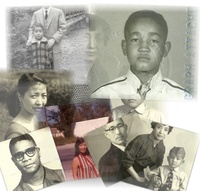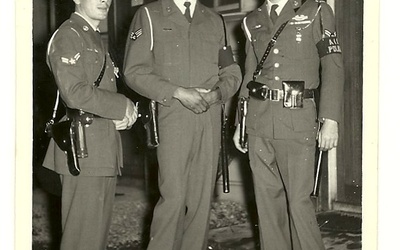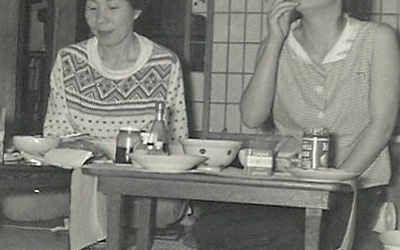Excerpts from "Dream of the water children, dream of the water children"

This is an anthropology of memory, a journal and memoir, a work of creative non-fiction. It combines memories from recall, conversations with parents and other relations, friends, journal entries, dream journals with postcolonial critical analysis.
This first book of a planned trilogy: Dream of the Water Children, dream of the water children focuses on sociological haunting and legacies of race-relations, gender, and war-trauma, told through the lens of the mother-son relationship. Its specific focus is on the mother, Kakinami Kiyoko. It is a work for all those interested in Black-Japanese mixed-race people and their parents, the US militarization of the Pacific after World War II and its complex legacies through Black-Asian identities, and gender relations, and the will to freedom.
Note for the Reader
All the incidents and events in this work, including dreams, are actual events and constructed and/or recorded from memories including recall and meditations, journal entries, conversations and interviews. Although memory and journal entries have been recalled and used, I have taken liberty in the writing of memory itself, using certain tones and descriptions in lieu of not remembering or knowing completely, certain details of past events. Some names have been changed to protect people’s identities. I have noted references to those events, facts, and comments that are not from memory or conversation.
Since I am a ethnographic research scholar, as well as all of the categories that identify me as person, race, gender, socio-economic class, sexual orientation, from a certain region, time-period in history, with certain relations with history, my parents and friends, places, and my ways of thinking and remembering, the vignettes I produce for you, the reader, in this book, represent all of these parts of me, without leaving things at the door. In this, there are silences. There are spaces where I hope that the reader will think and question, along with feeling, remembering, in order that we may transgress dominant norms, and therefore easy categories of life. Often these categories keep us apart, afraid, angry, unreal. Memory as a disjointed recall, told through the passages of transnational homelessness, disjunctures and juxtapositions, and the continual legacies that dot the different landscapes, is where I leave you, the reader, with, in order to open dialogues toward peace, social justice, and a different imagination of homelands.
Note from the author:
SEEKING EDITOR: I am presently looking for an editor, familiar with cross-genre writing and transnational, transcultural writing. If you or someone you know would be willing to do this, please contact me!
Also, SEEKING a PUBLISHER. I have multimedia projects and other books in relaiton to this first work, that I would love to work with an interested publisher on.
For these and other inquiries, please contact: fredrickdc@gmail.com
Stories from this series
Part 6: Constant King [2 of 2]
Aug. 5, 2011 • Fredrick Cloyd
Read “Part 6: Constant King [1 of 2]” >>How, then, are manhood, fatherhood and hierarchies constructed in this? It’s not just one thing. You’re too young to remember, I think. One time I was giving you a bath. It was at our house in Ōme. Your Dad came to Japan to see how we were doing, a year after he was here for your birth. We were still waiting for the American government to let us marry. Until then, your …
Part 6: Constant King [1 of 2]
July 29, 2011 • Fredrick Cloyd
Read “Part 5: Monsters” >>The Constant King 1964Mama and Dad and myself are at the dinner table. It was really the first full year ever, that Dad sat at the dinner table with Mama and I for a meal or two. In the past, he had been out of the country where Mama and me lived. When I was born it wasn’t good that he was with us, according to the military. So he was in America and Korea. In …
Part 5: Monsters
July 22, 2011 • Fredrick Cloyd
Read “Part 4: Neighbors/Next Door” >>Monsters 1950 Shōwa Year 25化け物 昭和25年From a leaflet from the U.S. armed forces made available to the occupation soldiers during the strongest period of attempting to implement the anti-fraternization policy which tried to discourage relations between Japanese women and occupation personnel: “[Japanese women] have been taught to hate you. They do as their men tell them, and many of them have been told to kill you. Sex is one of the oldest and most effective …
Part 4: Neighbors/Next door
July 15, 2011 • Fredrick Cloyd
Read “Part 3: Watermelon Seeds [2 of 2]” >>Neighbors/Next door, Mama around 1940となり、昭和15年ごろ“These expressions are extremely crude and regional, and have a rustic air; middle-class Tokyo residents would laugh at their provincial quaintness.” —Dorinne Kondo1 We were obviously not 江戸っ子 Edokko.2 People reminded us that we were foreign and special, even though we were Japanese. Older sister spoke louder than other girls around and liked to be around the girls who were always in trouble at school and were …
Part 3: Watermelon Seeds [2 of 2]
July 8, 2011 • Fredrick Cloyd
Read “Part 3: Watermelon Seeds [1 of 2]” >>I am still an only-child. But now my only child identity was not the same as just a moment before. I was born alone but because a sister died. Fragments of unknowns become apparent. I then felt relieved. Some things fell into a certain logical reasoning—or perhaps it was a certain logic that offered comfort. I was an only child, but now I reasoned that a protector-twin had been watching over me, …
Part 3: Watermelon Seeds [1 of 2]
July 1, 2011 • Fredrick Cloyd
Read “Part 2: The Waters [2 of 2]” >>Watermelon seeds, 1964 Shōwa Year 39スイカの種、1964年 昭和39年“One of the remarkable features of this group is that it seems that all the war children receives[sic] a stigma, whether the father was an enemy soldier or an allied…We have to understand that this stigma often is associated with the status of the mother.” —From: The War Children of the World1 Lovers—a Japanese man and the French woman, speak: He: You saw nothing in Hiroshima. …

![Thumbnail for Part 6: Constant King [2 of 2]](https://devmedia.discovernikkei.org/cache/db/9a/db9a76bfa18f9490e494f486f64512db.jpg)
![Thumbnail for Part 6: Constant King [1 of 2]](https://devmedia.discovernikkei.org/cache/62/17/6217bb1959862992c0fa06102b0fa6d6.jpg)


![Thumbnail for Part 3: Watermelon Seeds [2 of 2]](https://devmedia.discovernikkei.org/cache/9d/f0/9df0d7061a12355f20bb8ba7a7ebc6ab.jpg)
![Thumbnail for Part 3: Watermelon Seeds [1 of 2]](https://devmedia.discovernikkei.org/cache/4a/05/4a056fdbaaa352626f4f66cc41cba99d.jpg)

